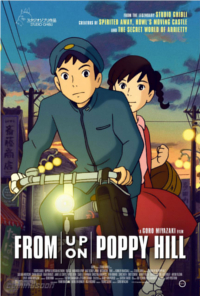Kids On A Bike: Goro’s Seaside Sophomore Effort Floats
 Being the son of animation’s unequivocal living master who’s body of work ranks among the greatest cinematic creations ever made, Goro Miyazaki understandably had much trepidation about taking up his father, Hayao’s craft. When he finally succumbed to the family business after being approached by Toshio Suzuki, one of Studio Ghibli’s longest running producorial collaborators, neither Ghibli’s seasoned animators or the majesty of the company’s lineage could save Goro’s paltry debut, Tales from Earthsea. Notably missing Hayao’s direct involvement thanks to familiar disagreements, the film, rich with dragons and magic, became one of the least enchanting releases of Ghibli’s generally pristine catalog. Approaching Goro’s sophomore effort with the same apprehension he began his directorial career, with doubts of creative significance lingering in the long, overbearing shadow of his father, we find that From Up On Poppy Hill abides as a worthy, yet minor entry into the Ghibli universe.
Being the son of animation’s unequivocal living master who’s body of work ranks among the greatest cinematic creations ever made, Goro Miyazaki understandably had much trepidation about taking up his father, Hayao’s craft. When he finally succumbed to the family business after being approached by Toshio Suzuki, one of Studio Ghibli’s longest running producorial collaborators, neither Ghibli’s seasoned animators or the majesty of the company’s lineage could save Goro’s paltry debut, Tales from Earthsea. Notably missing Hayao’s direct involvement thanks to familiar disagreements, the film, rich with dragons and magic, became one of the least enchanting releases of Ghibli’s generally pristine catalog. Approaching Goro’s sophomore effort with the same apprehension he began his directorial career, with doubts of creative significance lingering in the long, overbearing shadow of his father, we find that From Up On Poppy Hill abides as a worthy, yet minor entry into the Ghibli universe.
Based on a serialized comic by Tetsurō Sayama about Japanese youth off the Port of Yokohama as they prepare for the coming 1964 Tokyo Olympics, Hayao and Keiko Niwa’s somewhat typecasting script follows the tale of a pigtailed teenage girl named Umi (Masami Nagasawa). The daughter of a fallen seaman of the Korean War, she still raises signal flags abreast of the boarding house in which she currently lives, as if failing to do so will cause her to forget her father’s valiant memory. After fortuitously taking part in a stunt promoting the conservation of the student body’s beloved, but decrepit old clubhouse from the clutches of Olympic demolition, Umi quickly falls for a young boy at the head of the charge, a handsome, zealous young man named Shun (Junichi Okada), who we soon find has been a secret admirer of sorts, the author of an anonymously published poem venerating Umi’s daily flag flying. Though at first their relationship seems one of juvenile flirtation, unbeknownst to both parties, their acquaintance runs much deeper than initially foreseen.
At its core, the tale retains a standard Ghibli theme – that of adolescent self discovery in the face of personal hardship – but what is odd, especially when taking into consideration that Hayao was one of the two screenwriters on the project, Goro’s film settles into the realistic lineage of Hayao’s partner, Isao Takahata, the director of such films as the monumentally devastating World War II feature, Grave of the Fireflies, and the lighter dramatic romance, Only Yesterday. Amusingly, Poppy Hill shares the most semblance with Takahata’s Pom Poko, a tragi-comedy about the impacts of deforestation for Japan’s fabled magical raccoon population. Sharing a visual language of humorous uniformal character masses (matching academic attire against shape-shifting grey raccoons) and a kindred light-hearted tonality, both pictures deal with the challenges of saving a cherished homestead, though Goro’s film carries much less consequential weight and still fails to yield the lyrical whimsy of Takahata’s often overlooked classic.
Though lacking the achievement of any real depth – the vast majority of the character body is glanced over in broadly generic pretenses and the final epoch rings a bit emotionally hollow – there are several moments of pure heart-warming cinematic bliss. A scene in which Shun gives Umi a bike ride down Poppy Hill to the seaside market is both obvious in its affective manipulation and subtly magical all the same. And while Tales from Earthsea lacked the lush attention to detail that sits as just one facet that sets Ghibli apart from other arbiters of hand drawn animation, Poppy Hill makes visual leaps and bounds ahead of Goro’s lackluster debut. Every frame is meticulously hand crafted to embody the maturing cultural revolution of the 60s with fine appreciation for the period and a love of seaside living. Drawing all of these foreign parts together, Satoshi Takebe’s jovially jazzy original score perfectly sets the mood for gleefully rebellious teens to rage against the machine that is the local board of education.
From Up On Poppy Hill is certainly not Goro’s Nausicaä, but it’s not a total failure either. Even Hayao and Isao had years of animation experience under their belts working on Future Boy Conan and other cable shows before forging any of their masterpieces. The supreme linage of Studio Ghibli has got to be soul crushingly oppressive for the still fresh faced helmer. The younger Miyazaki just seems to need a little practice. Let’s hope the third time’s a charm.


